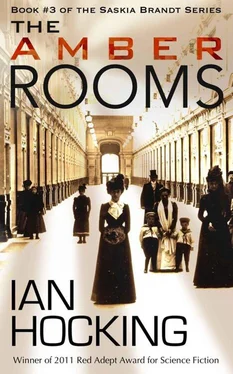Saskia knew she was in the Amber Room— her room, on the night of 23rd May, 1908—before even she felt the absence of her left hand, or the scent of room perfume and gun smoke, or the approaching crackle of fireworks. She did not wake slowly. Her consciousness returned in full bloom and she snapped upright, gorging on her surroundings in a sweep that rekindled the sense of despair and failure she had felt only heartbeats ago in a parallel Geneva, in the flames of a burning house. She understood, without knowing why, that her return here was final. If the malfunctioning time band had caused a crack in reality—wide as a doorway in an enfilade—that crack had been sealed. But the meaning of those other Amber Rooms was inscrutable. Had another person, perhaps a time traveller, deliberately interfered with the band to trigger a malfunction? If so, Saskia could not think why her transmigration might advantage that third party. Her struggle with this produced another question: Had this person been working against her, or for her? To answer that, she needed to know what the outcome of the transmigration had been. The outcome remained elusive. Perhaps it was better to think of her journey as a meaningless trip little different from being swept down a street by a flash flood. She might feel lucky that there was solid ground beneath her once again.
The room was lit by its chandeliers once more. The air remained dry, but the floor was wet with dew. There were piles of broken glass beneath the dark rectangles where the mirrors had been. The band, which Saskia remembered being in the centre of the room, was gone. Only a scorch mark remained. Soso and Kamo had gone, too. The door behind them, which led deeper into the enfilade, was open. Masked guests were standing there. Where mouths were exposed, they were agape. The doors to the balcony opened and guests entered. They began to talk in a mixture of English and French. Behind her, Saskia could hear a furious thumping on the door that led away from the enfilade. Men were shouting.
Pasha lay with his head against the base of the statue. He might have been the younger, sickly brother of the Pasha who had been cradling Saskia’s dead head, rather than his twin. This Pasha had his doublet torn open. The wound to his abdomen was worse than Saskia remembered. Blood had soaked his trousers and much of the floor beneath him. Saskia knew he was dead, but she put her hand to his cheek and looked for something in his half-open eyes.
There had been a moment when she had died, too. Not in that parallel Geneva, but in this reality, in a hut somewhere in the Bavarian National Forest. Her saviour had been a transfusion of i-Core. She considered giving Pasha such a transfusion. There was a risk that the i-Core would destroy his identity and rebuild it in a form closer to itself and further from Pasha. What would it do to him? Her thoughts stopped on the unsettling experience of becoming the dog that had killed one of her attackers the night she left the Count’s villa in Zurich. She had smelled using its nose; tasted the blood with its tongue. She feared the dehumanising force of the i-Core. Could she make that choice for Pasha? Would he prefer to be dead? His orthodox faith might be troubled.
The door behind her gave way with a loud crack. She had time to hear the stamp of booted footfalls before she was lifted bodily by tall men, each holding an upper arm. They were Hussars of the Imperial Guard. Like the doors to the Amber Room, their dolman jackets were white but ribbed with gold. Sable fur hung across their shoulders. They wore flat-top bearskin hats that seemed to connect with their waxed moustaches and curled side-whiskers.
Another four hurried into the room and took station at the door to the Picture Hall, the door to the Apartments, and each of the balcony doors. The two at the balcony lifted their rifles and tracked through the crowd in the square. Saskia watched them with some anxiety, as did many of the guests. The Fourth Squadron of the Hussars of the Guard, based in the Tsar’s Village, had mutinied the previous summer, not long before the heist in Tiflis. The rebellion had been a reaction to the strict discipline imposed on them since the military reorganisations.
Alexei Sergeyevich Draganov stepped into the room and turned to Saskia. Even taller than the Hussars, he was conspicuous in the long, scarlet cherkesska coat and white beshmet vest worn by the Imperial Convoy. Draganov nodded to the Hussars, and they ushered the remaining guests from the room and closed the doors, until only Draganov, the Hussars, Saskia and Pasha, remained. The air in the room seemed to thicken. The smell of perfume and polish grew stronger and the chandeliers flared with an electrical spike.
It would not do to show any recognition of Draganov. Saskia could not know whether his Hussars understood the complexities of this situation. With that came the wry thought that Saskia might not have fully grasped those complexities either. Draganov’s expression was a study in ambiguity.
‘He tried to stop them,’ said Saskia. Tears ran down her cheeks. ‘My beloved, there, against the statue. Why don’t you chase after the murderers!’
She felt the grip of the Hussars lessen. That was good.
‘Unless they can become the night itself, the two won’t reach the end of the square,’ said Draganov. ‘Well?’ he called to the two Hussars at the balcony doors. ‘Do you see anything?’
‘No, sir,’ replied both men.
‘Keep looking,’ said Draganov.
‘Let me go to my betrothed,’ Saskia said. She wriggled weakly at the men holding her. ‘For what he has done, he is a hero of the Empire now.’
Draganov gave the body of Pasha a look of disgust.
‘That is as maybe. But we are here on the matter of a gross insult to the Treasury, and there will be no delay in justice.’
Even as he spoke, Saskia winced at the jingoistic tone. She wondered whether the Hussars knew, or cared, about the act he was putting on. But his order was obeyed. Saskia was released by the two Hussars. She fell to one knee and crawled to Pasha. His face was cyanotic and no air moved through his lips.
Saskia pulled away her silver mask and dropped it by his body. Then put her hand around the nape of his neck and lifted his head. His eyes opened like a doll. Before she kissed him, Saskia bit away a wedge of flesh from the inside of her cheek. The pain was lesser than she expected but the volume of blood greater. She had to swallow a mouthful before she could put her lips onto his. When she did, his skin was cold and dry. Gently, so as not to break the seal, she angled her head and took a small bite from his lower lip.
She knew that the i-Core communicated with her using a base form of language comprising metaphor alone. She did not know if the channel worked both ways, but she invested every effort in imagining a scene.
It is the fifth season, those few days between autumn and winter, and the Russian evening wanes. A widow stands above an open grave. It contains a simple coffin whose plaque is dull and unreadable in the darkness. The clouds gather to form rain, but sparrows, not water, pour from the sky, swirling towards the grave as though it were the base of a dark tornado. As the grave brims over, their wings buzz like black flames. The birds thrash against each other, crunch, fall, until they breach the coffin and gather beneath its body. Slowly, the body lifts. Though the sparrows have cast a gloom over everything, the widow sees two flashes of whiteness as the eyes of the corpse open.
Saskia fell away from the body and sobbed hard. She held her hand against her cheek. Blood flowed from the wound. She did not know whether she had passed enough into Pasha. Neither did she know how the i-Core would be able to infuse his tissues, particularly his brain, without vascular action in his body.
Читать дальше












